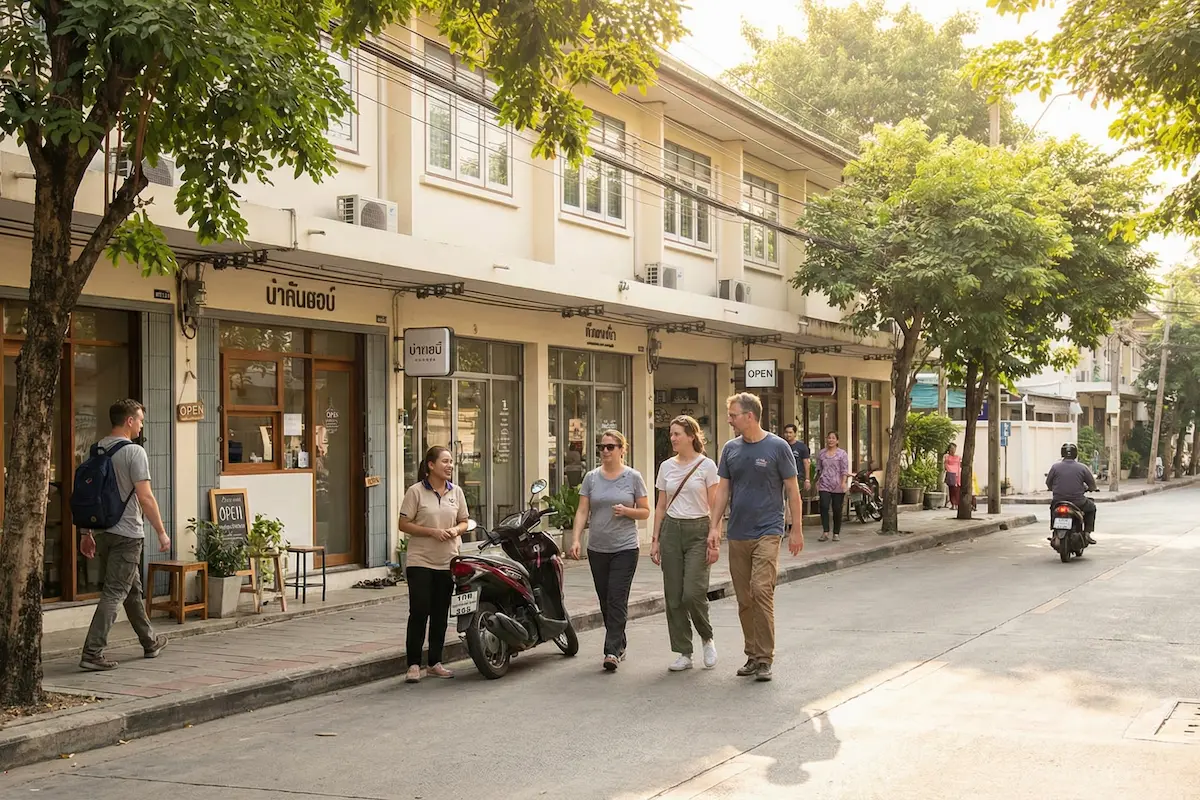Teach English in Thailand with myTEFL. Flexible contracts for native and non-native English speakers. Placements in Bangkok, Chiang Mai, and Phuket with visa sponsorship and housing assistance.
Teach English in
Thailand
Experience the Land of Smiles with a reliable salary and full legal support in top destinations like Bangkok, Chiang Mai, and Phuket. Our partners provide 35,000 THB/month, work permit sponsorship, and on-the-ground accommodation assistance.
Non-Natives
Fluent Speakers Welcome
Visa Support
Work Permit Included
6 or 12 Mos
Flexible Contracts
Teach English in Thailand with myTEFL. Earn 35,000 THB/month (~$960 USD) with accommodation assistance in Bangkok and Chiang Mai. Flexible 6 or 12-month contracts available. Open to native and fluent non-native English speakers with a degree.
Teach English in Thailand
From the bustling streets of Bangkok to the serene mountains of Chiang Mai, Thailand offers an iconic TEFL experience. With flexible contracts and accommodation support, it is the perfect entry point for teachers seeking adventure and culture.
Why Choose a TEFL Job in Thailand?
Great Local Salary
Earn a reliable 35,000 THB (~$960 USD) per month. With affordable street food and low local costs, your salary goes far, allowing for travel and a fun lifestyle.
Flexible Commitments
Unlike many other Asian destinations, Thailand offers 6-month contracts (one semester) as well as standard 12-month options, giving you more freedom.
Inclusive Hiring
We welcome diversity. Positions are open to degree holders from most nationalities—you do not strictly need a passport from the "Big 7" countries to apply.
Full Support Network
Enjoy peace of mind with airport pickup, orientation, and 24/7 on-ground support. We assist you with finding safe, affordable accommodation upon arrival.

Visual gallery of the TEFL experience in Thailand: Teaching young students, enjoying Bangkok street food, exploring Buddhist temples, and relaxing on island beaches.
Life in Thailand for English Teachers





From Application to Classroom
We handle the logistics so you can focus on the adventure. Our step-by-step process ensures your documentation, visa, and school placement are secured before you fly.
Trusted by Global Teaching Programs





Teach English in Thailand job benefits: 35,000 THB/month salary, accommodation assistance, and work permit support. Requirements: Bachelor's degree, age 21-55, native speakers or eligible non-native speakers (with intro video).
Benefits & Requirements
We provide a structured support package designed to make your transition to Thailand smooth, legal, and culturally immersive.
Monthly Salary
Earn 35,000 THB per month
(approx. $960 USD)
Housing Assistance
On-the-ground support finding safe and affordable accommodation near your school.
Visa & Work Permit
Full guidance and paperwork support for obtaining your legal Non-Immigrant B Visa.
Travel Perks
Includes airport pickup and a 10,000 THB flight reimbursement (on select contracts).
Flexible Contracts
Choose between 6-month (one semester) or 12-month contracts to fit your travel plans.
Orientation
Comprehensive orientation and training upon arrival to get you settled and classroom-ready.
24/7 Support
Access to dedicated on-ground support staff for emergencies or general questions.
Teacher Community
Join a network of fellow international teachers with regular social events and meetups.
Professional Growth
Gain valuable classroom experience with continuous professional development opportunities.
Who is Eligible?
- Citizenship: Native & Eligible Non-Natives
- Education: Bachelor's Degree (Any Subject)
- Age: Between 21 and 55 years old
- TEFL: 120 or 140 Hour myTEFL Certificate
- Contract: 6 or 12 Months
- Intro Video: For Non-Native Speakers
Start Your Journey
If you meet these criteria, our placement team is ready to match you with top schools in Thailand.
- Citizenship: Open to native speakers and many non-native nationalities (depending on current visa regulations).
- Degree: A Bachelor's degree (or higher) in any subject is mandatory for the work permit.
- TEFL Certification: You need a 120-hour or 140-hour myTEFL certificate.
- Age Requirement: Applicants must be between 21 and 55 years old.
- Contract Length: Flexible options for 6 months (one semester) or 12 months.
- Introduction Video: A 30-second self-introduction video is required for non-native applicants only.
- Pre-Departure: Includes information and advice pack before you fly.
Don’t Have a TEFL Yet for Thailand?
A 120-hour TEFL certificate is standard for securing a legal Non-Immigrant B work visa in Thailand. Complete your accredited certification with myTEFL to unlock school matching and visa support.
Stories from Our Thailand Teaching Community
Verified myTEFL graduates currently teaching English in Thailand, including Bangkok, Chiang Mai, and Phuket.



Teaching English in Thailand: FAQs
Quick answers about salaries, visas, and requirements for our Thailand job placement program.
Frequently asked questions about teaching in Thailand. Covers the 35,000 THB salary, Non-Immigrant B visa, eligibility for non-native speakers, and the requirement for a Bachelor's degree.
Apply for English teaching jobs in Thailand. This form screens for Non-Immigrant B visa eligibility, including Bachelor's degree status and nationality requirements. Open to native and fluent non-native English speakers. Start your placement process for schools in Bangkok, Chiang Mai, and Phuket.
Start Your Thailand Application
Complete this quick screening for teaching English in Thailand. We’ll verify your eligibility for the Non-Immigrant B work visa and send you the next steps.
Application Received!
Thanks — we’ve received your Thailand application. Check your email for next steps regarding document preparation and school matching.
